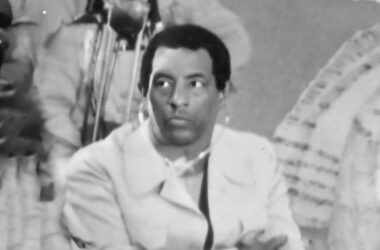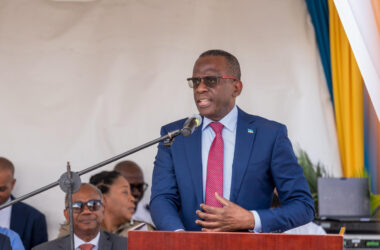
A Press Conference used to be just that – an event where journalists — The Press — listen to presentations and ask questions to inform their reports to respective media houses for printing, broadcasting and publishing.
So, when the Office of the Director of Public Prosecutions (DPP) last month advertised a press conference to update the public, through the press, on issues relating to outstanding investigations into and prosecution of police officers accused of responsibility for extra-judicial killings, my antenna went up – way up…
Why?
First of all, it was an unusual move; and secondly, I was unaware of any new related development, but since it was the DPP making himself available to the press, I assumed there could have been some new and special reason for the unusual press conference by the nation’s top prosecutor.
I followed online — and was glad, because, like a bikini, the event revealed as much as it concealed, with the balance of probability weighing on who’s holding and weighing the scales of justice.
The press representatives didn’t ask the DPP any question he couldn’t answer, as the reporters’ inquiries, though loud, were about cases in so-called ‘Cold Case’ files, as the wheels of justice turn slowly around them.
Nothing said surprised me, but I was concerned about the way the press representatives present displayed an inability to distinguish the media representatives (journalists, reporters and others) as a professional entity separate from the many online rabblerousers commenting wildly on cases in ways that more disclose their ignorance of how the law operates and how the press covers court cases.
The media persons who asked questions could have been counted on one hand, including some sounding like having higher audio levels and lower levels of interest in reporting, more interested in soundbites for online cannon fodder than really caring about what the DPP said, could have said, or didn’t say.
But then, it didn’t take long to discover what was supposed to have been a press conference had been hijacked and turned into a public town hall meeting, where bereaved families (relatives) and legal advocates involved in ongoing judicial proceedings had decided to ambush and bushwhack the DPP, Live and Direct, in both the global public square and the square of local public opinion.
It wasn’t your usual Market Steps or Boulevard political meeting, but more of a public trial of the DPP, prosecuted by the members of the press and legal and human rights advocates, with no judge or jury.
Press people without media outlets dedicated to reporting daily news competed to ask unanswerable questions about matters under investigation or still being prosecuted — even investigated – over-a-decade later and therefore inconclusive; and relatives simply took the opportunity to again bare their understandable frustrations after many years of seeing justice as being blind to their just causes.
The over-two-hour live session went way-over time and the live feed was cut at precisely the same time when the most important question (in my view) was asked by a genuine reporter: “Why was this press conference called?”
Unfortunately, viewers (me included) never heard the response, but while some who didn’t know how or really care to ask questions declared the event a virtual (online) waste of their time, I know the DPP achieved his aim: of saying just what he wanted to say and nothing more.
He dismissed the controversial IMPACS Report as an actual mess of hearsay pottage with absolutely no evidential value and indicated he’d made undisclosed recommendations regarding unidentified cases, threw the outstanding cases into the Police Commissioner’s pot and calling for establishment of an independent entity to investigate police killings and crimes involving accused police officers.
In other words, the DPP wanted it known that while his office was overwhelmed with thousands of outstanding matters at any one time and while the turnover rate doesn’t allow it to process cases as fast as those awaiting justice will wish, he nonetheless wants his office to be the ones involved in final prosecution.
He didn’t exactly say he opposed the police investigating themselves but everything else he said sounded like those words that never came from his lips.
Recognizing that the local press isn’t schooled in and largely unwilling to sit-out court cases in this Internet Age, the DPP still invited the press to start attending and covering the cases they stay away from and only expect to extract statements from him online or at live-streamed press conferences where they’re better seen and heard.
In an age where media houses, reporters and journalists are definitely more interested in scoring online ‘likes’ than going offline after the facts, you will always get tragicomedies like we saw and heard last week, where reporters actually told the DPP he should sidestep the law and answer their questions in the ways they want, simply because: “We are The Press…”
As I watched and took copious ‘pen and pencil’ notes while fingering my keyboard at home, I walked a few brief times down Memory Lane to the days when any new reporter’s first assignment was to ‘Cover the Courts’ – not as punishment but to be able to understand how the court process works, how justice is weighed and served and to be in a better position to know how to report without your media house being charged for reporting in ways that will prejudice cases still being judged.
The DPP did the only thing he could: he invited the press to cover the courts, but the response was that he should arrange for the press to cover cases online — in which case they will still miss the Bottom Line: that you have to be present to hear and witness what the judges rule on what can and cannot be reported.
From covering magistrates court cases relating to one Philip Doxilly in which his land was said to have been sold by his mum on a date after she died and his eventual declaration as “a vexatious litigant”, I learned a lot about why lawyers will also tell you “The law is an ass!”
But today’s crop of reporters is more interested in being ‘first’ with ‘Breaking News’ than being accurate, even truthful by the laws of journalism and reporting.
Actually, I closed my notes that day with a N.B. (Nota Bene) to call the DPP and recommend that his office organize a workshop on the importance of ‘Covering the Courts’, but from what I see, hear and read every day here (and elsewhere in the region) attendance will most-likely be very-low.












